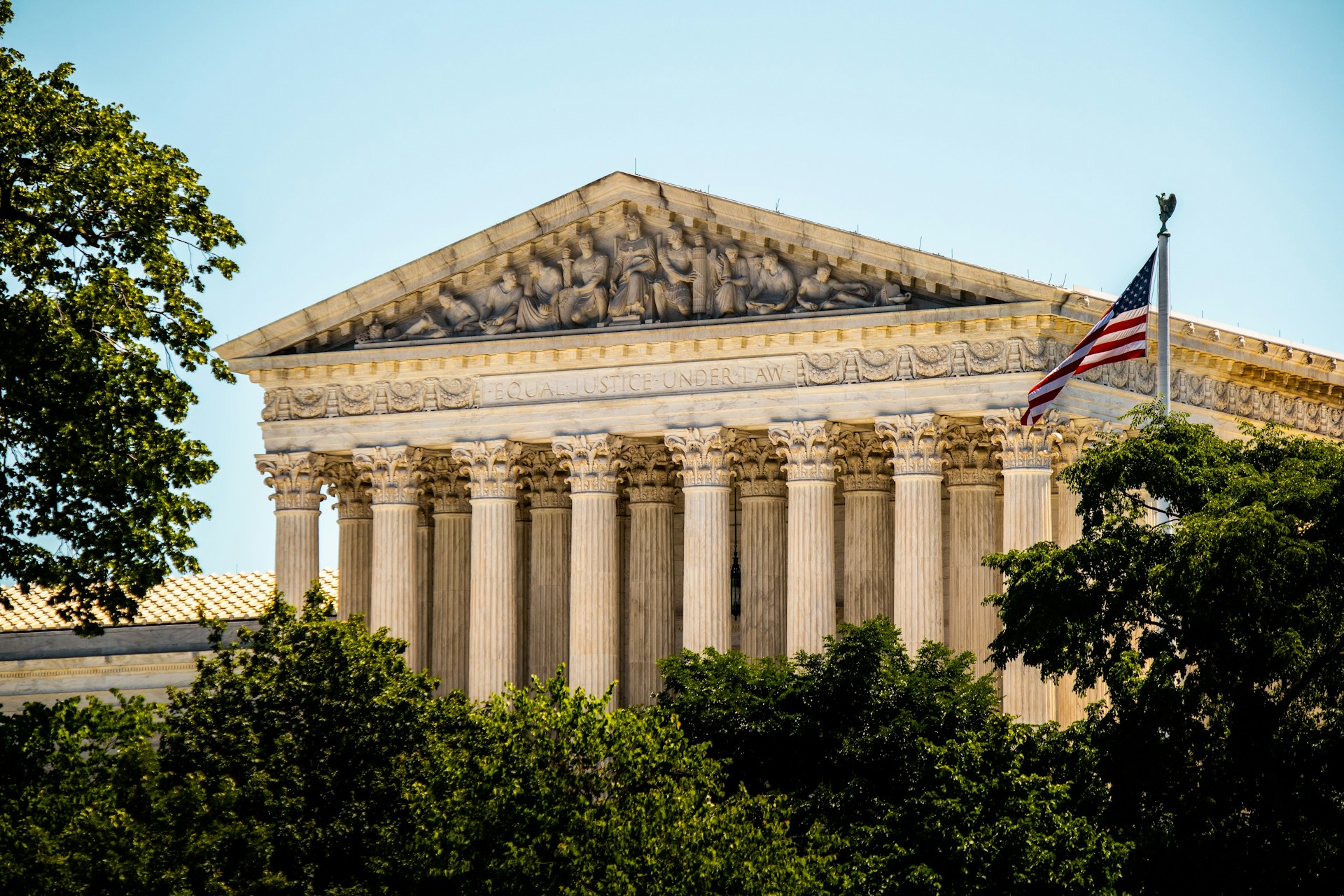Freedom
Supreme Court Upholds Religious Freedom in Landmark Ruling

In a resounding victory for religious freedom, the Supreme Court has delivered a unanimous 9-0 decision in favor of the Catholic Charities Bureau (CCB), marking a pivotal moment for religious liberty in America. This ruling is a clear stand against government overreach into the sacred realm of religious life, affirming the foundational principles laid out by our Founding Fathers.
Tiffany Dunkin, a legal fellow and attorney with the First Liberty Institute, expressed her satisfaction with the decision, stating, “This was not a hard call.” The case centered around Wisconsin’s attempt to deny a religious tax exemption to CCB, arguing that since the organization does not exclusively serve Catholics or proselytize, it should not qualify as a religious institution.
“What Wisconsin was doing… they were saying that the Catholic Charities was not a religious institution because they did not proselytize or serve people of their own faith,” Dunkin explained. This stance was a direct challenge to the First Amendment, which prohibits the government from defining what it means to be religious.
The case, Catholic Charities Bureau Inc. v. Wisconsin Labor and Industry Review Commission, questioned whether faith-based nonprofits that provide public services are “religious enough” to receive the same benefits as churches. Catholic Charities, affiliated with the Diocese of Superior, Wisconsin, provides essential services for people with disabilities and mental health needs. Yet, Wisconsin argued these acts were not “primarily religious.”
Justice Sonia Sotomayor, in her opinion for the court, made it unequivocally clear that the government has no authority to assess or rank the religious nature of charitable work. This decision is a beacon of hope for religious organizations across the nation.
Dunkin highlighted the broader implications of the ruling, noting, “This is actually a pretty ongoing problem across the country.” She pointed out similar challenges faced by other faith-based organizations, such as Dad’s Place in Bryan, Ohio, and others in Colorado and Arizona. These organizations have been questioned for their religious status while providing food, clothing, or shelter to those in need.
“Even though there are churches doing this kind of work, the governments are saying, ‘Well, you’re not religious enough,’” Dunkin said. The court’s language in the ruling “affirms what the Supreme Court has said for nearly a century,” emphasizing that the government cannot choose which expressions of faith are valid.
“This sends a great message to people of all religions and all charitable organizations,” she said. “The government… cannot intrude into telling you exactly what you can and can’t do, whether you’re religious or not religious, in order to receive a government benefit or participate in society.”
Had the Supreme Court ruled otherwise, Dunkin warned, it would have had “grave implications” for religious charities and ministries nationwide. Such a decision would have allowed the government to meddle in religious doctrine far beyond the intentions of our nation’s founders.
“The government cannot step in and get involved in deciding and picking and choosing between one type of religious activity and another,” she asserted. For churches and ministries, this ruling is a call to action, encouraging them to continue their charitable missions with renewed vigor.
“They should feel emboldened to continue to do what they feel called to do by their religious faith… especially in a charitable sense,” Dunkin emphasized.
This decision is not just a singular legal triumph but a reaffirmation of the enduring strength of religious liberty in America. As Dunkin aptly put it, “One, an affirmance of what the First Amendment has always stood for… but of course, going forward, we do hope and we’re encouraged that religious liberty in America is alive and well.”
In these times, it is crucial to stand firm in our faith and uphold the values that have made this nation a beacon of hope and freedom. The Supreme Court’s decision is a testament to the power of faith, family, and freedom in shaping a society that honors its religious heritage.
Let us know what you think, please share your thoughts in the comments below.
Freedom
Convert’s Faith Leads to Unexpected Terrorism Charge

In a troubling development that underscores the ongoing challenges faced by Christians in Egypt, Saeid Mansour Abdulraziq, a courageous convert to Christianity, has been charged with terrorism after seeking to update his identification documents to reflect his newfound faith. This incident serves as a stark reminder of the importance of upholding religious freedom, a fundamental principle that should be cherished and protected in any free society.
Abdulraziq’s journey of faith began in 2016 when he embraced Christianity and was baptized into the Russian Orthodox Church. His decision to follow Christ came with significant personal sacrifices, including rejection by his family and hostility from his community. Despite these challenges, Abdulraziq remained steadfast in his faith, a testament to the power of conviction and the enduring strength that comes from a relationship with God.
On July 15, Abdulraziq was arrested at the Al-Matareiah police station in Cairo while seeking legal assistance to obtain official documents acknowledging his conversion. His arrest and subsequent charges of joining a terrorist organization and spreading false information highlight the severe consequences faced by those who dare to live out their faith in regions where religious freedom is not fully respected.
Christian lawyer Saeid Fayaz poignantly noted the plight of many converts in Egypt, stating, “They live in isolation and constant fear. Saeid believed in the Egyptian constitution, which provides for religious freedom, not realizing that it is a one-way freedom.”
This statement underscores the harsh reality that many Christian converts face in Egypt, where the promise of religious freedom often remains unfulfilled.
The broader context of religious persecution in Egypt is further illustrated by the recent court ruling transferring ownership of Saint Catherine’s Monastery to the state. This decision has sparked international concern, as it threatens the future of one of the world’s oldest Christian monastic institutions. Saint Catherine’s Monastery, located at the base of Mount Sinai, holds profound religious significance and has been a continuous center of Christian worship and pilgrimage since its construction between 548 and 565 CE.
We must stand in solidarity with those in Egypt and around the world who face persecution for their faith. The commitment to advocating for fundamental rights on the global stage is not only a reflection of national character but also a testament to faith-based principles.
In these challenging times, let us remember the words of Scripture that call us to “act justly, love mercy, and walk humbly with our God” (Micah 6:8). It is through an unwavering commitment to justice, compassion, and faith that we can make a meaningful impact in the lives of those who suffer for their beliefs.
Let us know what you think, please share your thoughts in the comments below.
Freedom
Judge Blocks Key Provision in Federal Funding Battle

In a recent development that underscores the ongoing battle for the soul of our nation, a federal judge has temporarily blocked a key provision of the Big Beautiful Bill Act, a landmark piece of legislation signed by President Donald Trump. This provision aimed to halt federal funding to Planned Parenthood, a move that aligns with the values of protecting life and ensuring taxpayer dollars are not used to support abortion services.
Judge Indira Talwani, appointed by former President Barack Obama, has ruled that certain Planned Parenthood clinics in Massachusetts and Utah can continue receiving federal funding while the legal battle unfolds. This decision, while disappointing to those who champion the sanctity of life, highlights the importance of perseverance in the fight to uphold our nation’s moral compass.
The Big Beautiful Bill Act, while not outright banning Planned Parenthood from receiving federal funds, strategically limits funding to organizations that perform abortions or receive substantial Medicaid funds. This approach reflects a commitment to ensuring that taxpayer dollars are used responsibly and in accordance with the values of life and family.
Talwani’s ruling is limited, applying only to clinics that do not perform abortions or receive less than $800,000 in Medicaid funds annually. This narrow scope is a reminder that the battle is far from over, and the defense of life remains a critical issue for our nation.
Planned Parenthood has expressed dissatisfaction with the ruling, emphasizing that their fight is not yet over. They argue that their services are essential for patients seeking birth control and STI testing, portraying themselves as indispensable to public health. However, it is crucial to remember that the core of this debate is about the protection of the unborn and the moral responsibility we have as a society to uphold life.
On the other side, pro-life advocates, including Susan B. Anthony Pro-Life America President Marjorie Dannenfelser, have criticized the ruling as an extension of forced taxpayer funding of abortion. Dannenfelser points out that “every day her decision remains in effect, millions are funneled into a business that profits from ending unborn lives and putting women at risk.”
This ruling comes on the heels of a significant victory in the U.S. Supreme Court, which recently affirmed the right of states to exclude abortion providers from Medicaid funding. This decision was a step forward in the fight to protect life and ensure that states have the autonomy to align their funding with the values of their citizens.
As we continue to navigate these turbulent times, it is imperative to remain steadfast in our commitment to faith, family, and freedom. The battle for life is not just a political issue; it is a moral one that demands our attention and action. Let us continue to pray for wisdom and courage for our leaders as they work to uphold the values that define us as a nation.
Let us know what you think, please share your thoughts in the comments below.
Freedom
Faith Endures as Congregation Worships After Church Fire

In a powerful testament to faith and resilience, the congregation of Pleasant Grove Baptist Church in Darlington County, South Carolina, gathered under tents for Sunday worship, just one day after a devastating fire consumed their historic church building. This act of devotion underscores the unyielding spirit of a community rooted in Christian values, demonstrating that the true essence of the church lies not in its physical structure, but in the hearts and souls of its believers.
“You can have church anywhere,” said churchgoer Tinika Reeves, capturing the sentiment of a congregation that refuses to be defined by loss. The church, led by the Rev. Eugene Thomas, has been a cornerstone of faith since its founding in 1869 and has stood as a beacon of hope and fellowship in the Back Swamp/Pocket Road community for over a century.
The fire, which engulfed the church on Saturday afternoon, prompted a swift response from multiple fire departments. Despite their efforts, the building, constructed in 1910, could not be saved. The Darlington County Sheriff’s Office and fire officials expressed their solidarity, stating, “Our thoughts and prayers are with Reverend Eugene Thomas and the Pleasant Grove Baptist Church family.”
Brian Gandy, director of the Darlington County Historical Commission and Museum, lamented the loss of one of the county’s oldest African American churches, yet he remained hopeful. “This congregation is one of the oldest organized African American churches in Darlington County and has a very rich history… This will be a blow, but with the members that I know at Pleasant Grove, they will rise above this and continue their legacy of serving God and their community.”
Rev. Thomas, reflecting on the aftermath, shared that his initial plan was to hold services at a nearby church. However, his congregation’s desire to worship on their own grounds prevailed. “All of a sudden, so many members came to me and said, ‘we want to be on our ground tomorrow.’ And I said, ‘yes, that’s it. That’s perfect. That’s just where we need to be at this time,’” he recounted.
The sight of the destroyed church was a heart-wrenching moment for many, including Reeves, who noted, “Once we pulled into the driveway, it was real. We felt it. And we just saw our building being totally destroyed.”
Yet, even in the face of such adversity, the congregation’s faith remains unshaken. Rev. Thomas, though initially broken by the sight of the destruction, found solace in the reminder that “the church is one thing, and it’s not a building. It’s the people.”
This poignant gathering underlines the enduring power of faith, family, and community—a testament to the strength found in unity and a shared belief in God’s providence. As Pleasant Grove Baptist Church moves forward, it serves as a reminder of the resilience that defines the American spirit and the unwavering commitment to uphold traditional values and freedoms.
Let us know what you think, please share your thoughts in the comments below.
-

 Self-Reliance8 months ago
Self-Reliance8 months agoTrump’s Bold Move Uncovers Massive Social Security Fraud
-

 News8 months ago
News8 months agoGovernor Walz’s Rhetoric Sparks National Controversy
-

 Faith7 months ago
Faith7 months agoNew Clues Emerge in Noah’s Ark Mystery
-

 Family8 months ago
Family8 months agoTexas Lawmaker Targets Furries in Schools
-

 News8 months ago
News8 months agoMel Gibson’s ‘The Passion of the Christ’ Sequel Title Announced
-

 Freedom8 months ago
Freedom8 months agoMaine Lawmaker Challenges Sports Fairness Controversy
-

 Family6 months ago
Family6 months agoCanada’s Controversial Policy Sparks Ethical Debate
-

 Faith6 months ago
Faith6 months agoMassive California Baptism Bash Shatters Records, Ignites Thousands!

